When picking out flooring for kitchens and bathrooms, the most important property one looks for is its water-resistant qualities. That’s why waterproof vinyl flooring is amongst the most popular picks for high-moisture areas like bathrooms and kitchens.
In this blog, you’ll learn everything there is to know about waterproof vinyl like SPC, and WPC as well as the properties and materials it’s made from that make it incredibly water-resistant and durable.
What is waterproof vinyl flooring made up of?
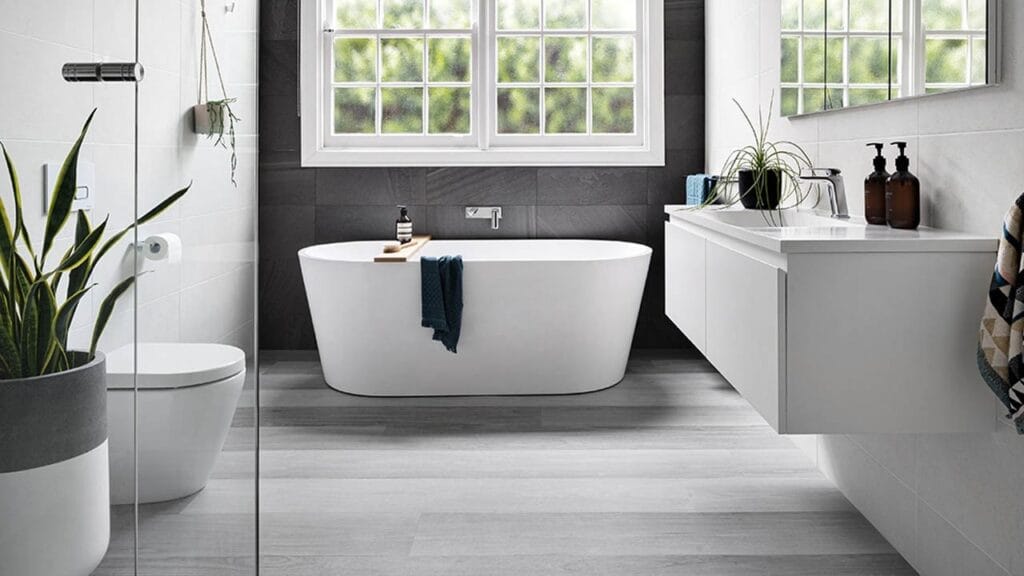
The main purpose of waterproof vinyl flooring is to tackle moisture effectively while being long-lasting. Therefore, polyvinyl chloride (PVC) is used to ensure a sturdy and strong core.
Hereafter, it’s combined with other materials that aid with water resistance. This combination is what creates effective and durable waterproof vinyl flooring.
Additionally, a protective coating is also applied to protect against stains, scratches, and wear. This blend of materials ensures that the flooring can handle contact with water without warping or degrading. It also makes it a solid choice for bathrooms, kitchens, and other moisture-prone areas.
Layers of Vinyl Flooring and thickness
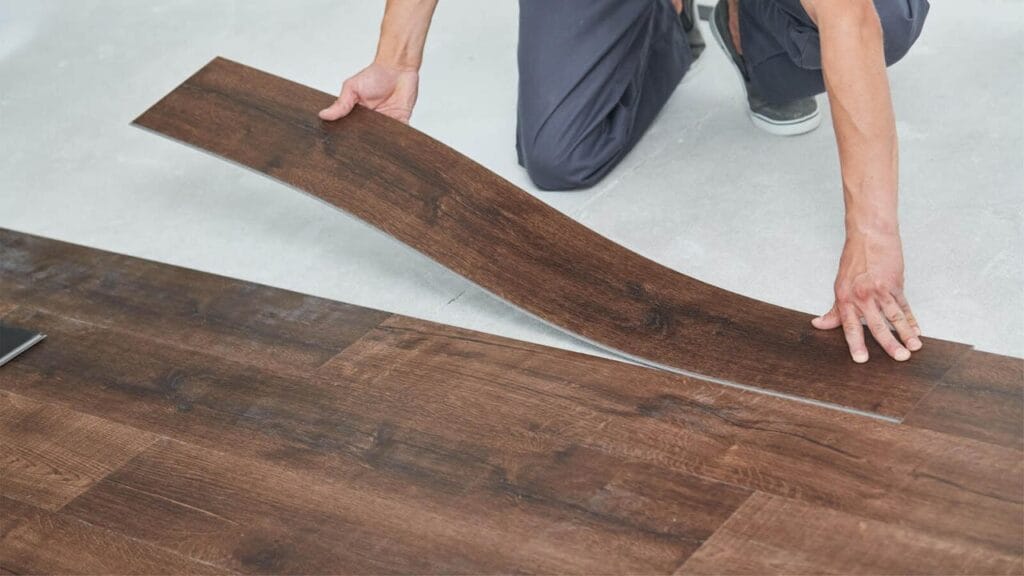
Vinyl flooring consists of four layers that work together. These layers include the wear layer, printed sheet, SPC core, and backing layer. It provides an excellent waterproof vinyl flooring option for bathrooms and kitchens.
Firstly, the top layer is known as the wear layer. It is made to protect against the daily wear and tear of everyday life like dents and scratches. It varies in thickness so the thicker the wear layer is, the more durable the flooring will be. You should get a thicker layer for especially high-traffic areas like kitchens and bathrooms.
Secondly, the layer is called the printed top layer. This layer essentially is there to provide the aesthetic appeal of solid wood flooring. It gives the illusion of real wood while not possessing its usual drawbacks. Such as being temperature-sensitive or prone to mould.
With advanced printing technology, this layer adds depth and texture to plain floors, making it visually appealing while being highly functional for kitchens and bathrooms.
Thirdly, there is a core layer. It is the SPC layer. It is made up of stone and plastic. Also, this layer has the properties of waterproof vinyl flooring. Because of the core, the waterproof vinyl flooring will not expand, contract, swell, or peel in liquid or moisture exposure.
Moreover, it ensures stability and stands strong even in humid temperatures. For moisture-proof flooring for bathrooms and kitchens, the core layer is crucial in preventing damage from water exposure.
And finally, the last layer of waterproof vinyl flooring that’s ideal for bathrooms and kitchens is the backing layer. The backing layer, as the name suggests, backs and supports the entire flooring.
It also contains sound insulation and additional cushioning for a quiet and comfortable environment for your home. The backing layer also protects against mould and mildew. It makes it best for damp environments such as bathrooms. This layer completes the vinyl planks and makes them durable and waterproof for your bathrooms and kitchens.
Is vinyl flooring waterproof?
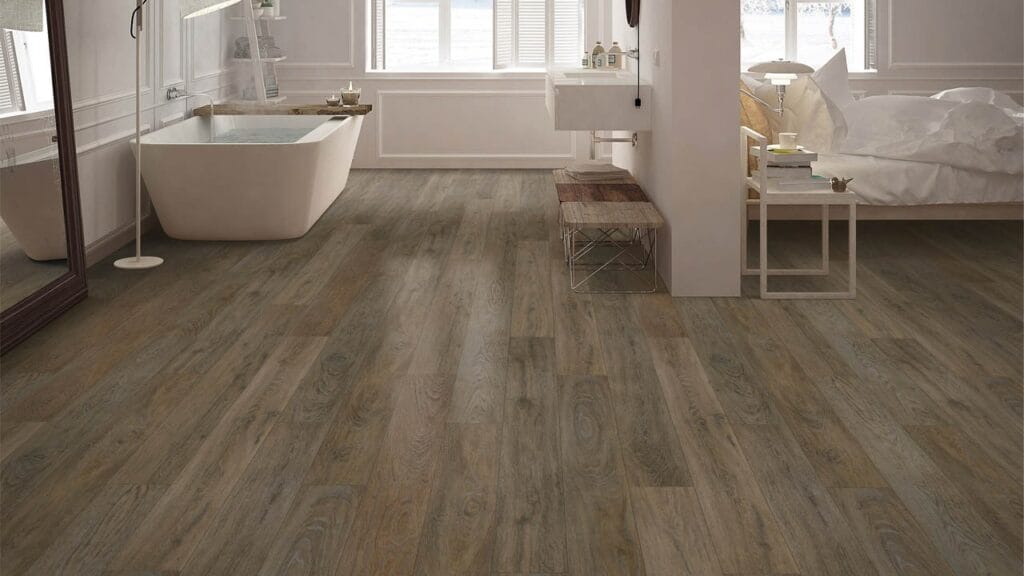
A common question regarding vinyl flooring is whether or not it’s waterproof. Waterproof vinyl flooring is specifically designed to be resistant to water and moisture. It is the best choice for moisture-prone areas like bathrooms and kitchens. Moreover, the materials used guarantee stable and waterproof flooring that is made to last.
This waterproof vinyl comes in planks. Vinyl planks are easy to install and can be a DIY project for small spaces like bathrooms. However, it’s important to note that while vinyl flooring is waterproof, proper installation and maintenance are necessary. These steps make sure that it performs to its full capability.
So, to ensure a long-lasting waterproof vinyl floor, you can contact Pay Weekly Flooring for installation purposes. To further maintain at home, you should confirm if the seams are sealed correctly. Also, promptly clean up spills when they happen.
Types of Waterproof vinyl flooring
There are two types of waterproof vinyl flooring that you can choose from for your bathrooms or kitchens. They are Stone-plastic composite (SPC) flooring and wood-plastic composite (WPC) flooring.
One is not better than the other, in terms of their ability to tackle moisture effectively. But they do contain different, distinct features so it simply depends on the preference and taste of the individual.
SPC Flooring
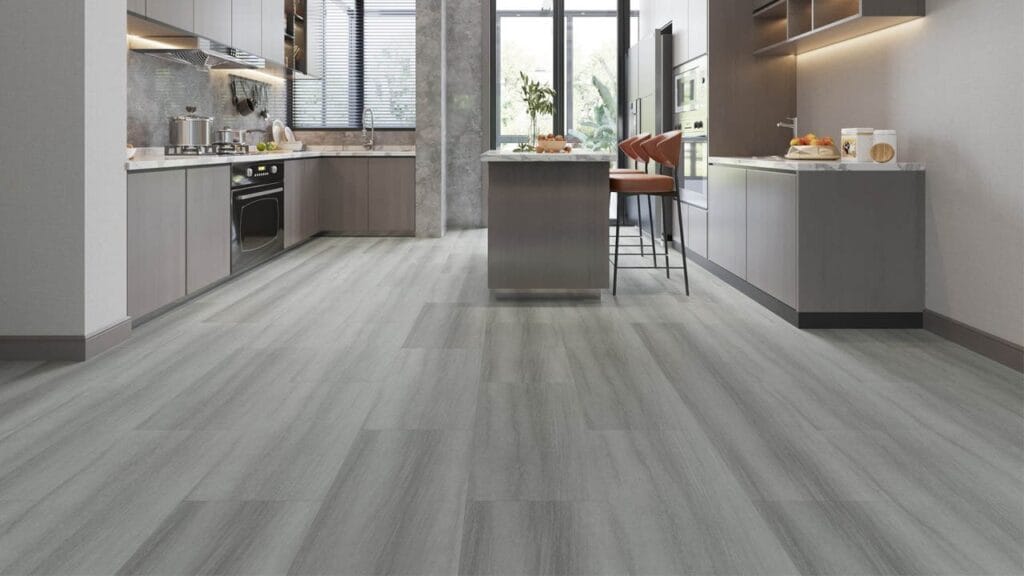
Stone-plastic composite (SPC) flooring, also known as rigid core vinyl. It contains stone powder and plastic which makes it a highly durable and impenetrable flooring option.
Because of its superior resistance to impacts, scratches, and water, SPC flooring is favoured by high-traffic areas or big families. Additionally, SPC flooring provides good sound insulation, which can be a huge help in busy households. Its ultra-dense core is unlikely to dent under heavy furniture, though it may not be as warm as WPC.
WPC Flooring
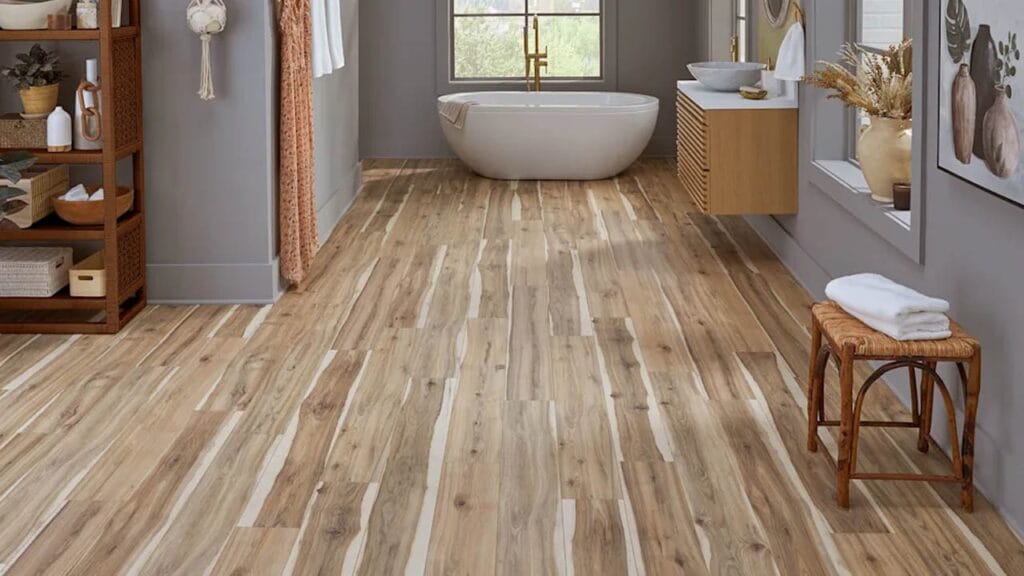
Wood-plastic composite (WPC) flooring has become increasingly popular for both residential and commercial spaces.
It is crafted from a mix of wood flour or fibres and heated thermoplastic resins. WPC flooring is 100% waterproof, durable, and easy to maintain. WPC flooring is the perfect choice for those wanting to add hardwood flooring to their kitchens or bathrooms. Hardwood flooring is celebrated for its naturally beautiful appearance. But people dread its lack of water-resistance and stain-resistant capabilities.
Therefore, water-resistant vinyl flooring is preferred in damp areas. It’s also notably warmer and comfortable underfoot, compared to SPC, making it more suitable for homes.
How long does waterproof vinyl flooring last?
Waterproof vinyl flooring’s lifespan depends on several things, like the quality, the installation and the maintenance. Generally, high-quality waterproof vinyl flooring, like the ones sourced from Pay Weekly Flooring, can last from 10 to 20 years.
There are different types of vinyl flooring available in the market. All of them have their different resilient properties. But they can last even longer if properly maintained, which entails regular cleaning. Also, avoiding excessive moisture is recommended. As well as using protective mats or rugs in areas that are frequently subject to spills.
Shop SPC – Waterproof Vinyl Flooring
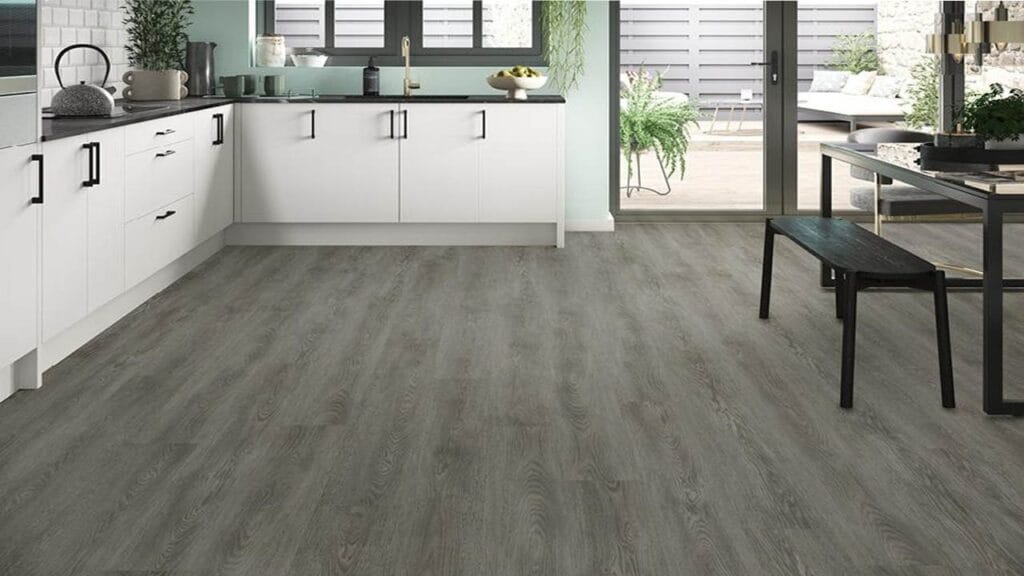
If you’ve decided to invest in SPC flooring for your homes or commercial spaces, Pay Weekly Flooring offers exceptionally tough and durable SPC flooring in flexible payment plans.
SPC has unmatched durability. Its resilience to withstand moist or damp areas is exceptional. And you can buy SPC flooring with bad credit. Because pay weekly flooring believes providing flooring to all. So, we make no credit checks or charge any interest or hidden fees. And you can install beautiful waterproof vinyl flooring at your home in easy instalments.
FAQs
Do you need underlayment for waterproof vinyl flooring?
Generally, underlayment isn’t necessary for waterproof vinyl flooring due to its many already existing protective layers. But you can still get one to add comfort and more sound insulation. Pay Weekly Flooring provides free underlay with every purchase.
Is vinyl flooring fully waterproof? Vinyl flooring is highly waterproof, but proper installation is needed to prevent moisture from seeping underneath. Pay Weekly Flooring provides free installation services with every purchase.

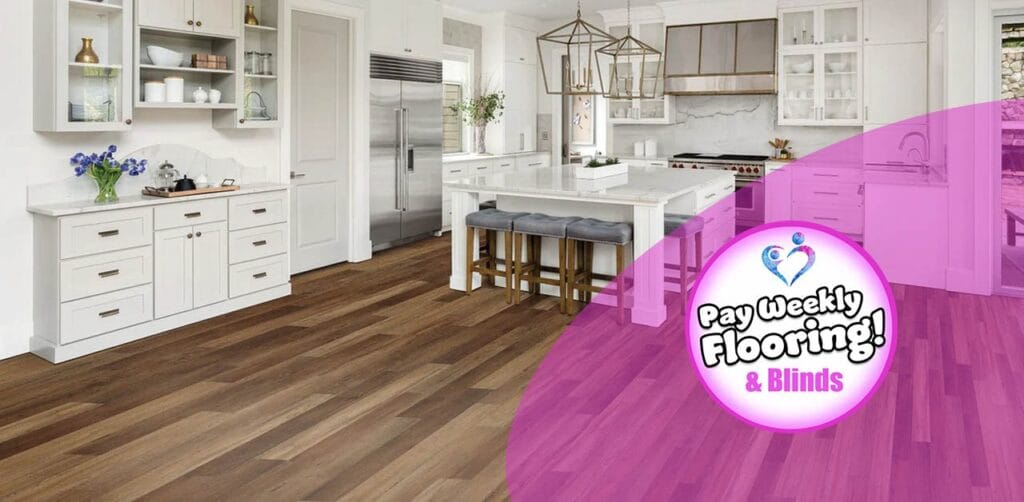
Hurrah, that’s what I was looking for, what a information! present here at this blog,
thanks admin of this web page.
Muchas gracias. ?Como puedo iniciar sesion?